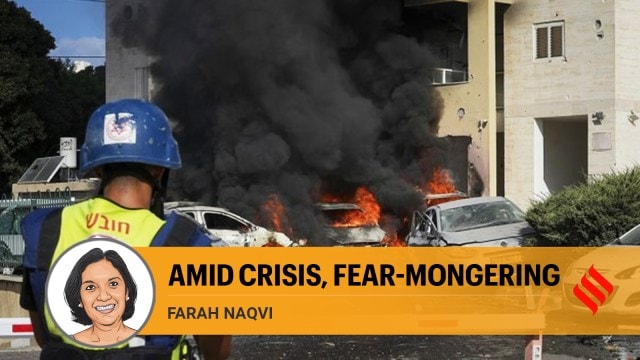
On a day when the Palestinian death toll crossed 7,000, including almost 3,000 children, with no end in sight, an article by a Jerusalem-based writer, Yeshaya Rosenman, was published in this newspaper (‘Congress plays with two fires’, IE, October 26). This should have been a time to choose words carefully. Not to provoke fear, sabre-rattle, or deepen divides here, domestically. The piece did all three.
A brief summary of the article is as follows: A statement by a political party in India, respecting the rights of Palestinians to land, life and self-determination, is tantamount to the following — moral bankruptcy, “deplorable sympathy towards the butchers (Hamas)”; evidence of support for all “jihadi violence”, alignment with the “darkest gallery of rogues” (named as Russia, Iran, Qatar); support for “the most pathological Iranian activity” (Iranian drone tactics were used by Hamas, claims the piece).
A statement respecting the rights of Palestinians could lead to — a “jihadist” take over of (India’s) streets, as is happening in France, where ISIS cells apparently gun down Frenchmen like ninepins; in India “the repercussions of such (Jihadist) violence would be broader” because we have a history of communal riots.
The only way, it seems, for us in India to avoid this terrible end, is for everyone to shut up about the Palestinians. Because sympathy for them could be seen as a sign of weakness of the Indian state and then it will be hell and damnation, because those “cunning” guys, lurking in the shadows, “fringes of the Indian Muslim communities” with “the Hamas style vision” will smell an opportunity and “roar into action.”
This is the sum and substance of this article. It predicted certain destruction of India if we did not view the world only from Israel’s perspective. It was ugly in its outrage that someone flouted the rules of the politics of condemnation — which demands demonstrable partisan fury every time there is any violent event involving some Muslims and Western powers and Israel.
The article’s joining of dots exemplifies both the subliminal and overt narrative around the Israeli-Palestinian conflict. Language is a weapon, and contested meanings would make Ferdinand de Saussure turn in his grave. Sign-signifier-signified — is a relationship in complete disarray. Israeli children murdered is a tragedy. Palestinian children murdered is victim porn. Humanitarian aid is what comes after killing the dehumanised. War crimes are moral actions. Resistance is aggression. Occupied and occupier are same-to-same.
The article in question is centred on attacking the Congress party for a statement that respected the rights of the Palestinian people to land, self-government and to live with dignity and respect, while also condemning the brutal attack against Israel. This statement so incensed the writer, that he decided to tell Indian readers that unless we fall in line with the Zionist view of the world, we (Indians) will pay a heavy price. He fishes in our troubled waters, trying to spread fear and divisiveness, to further his agenda around the conflict in the Middle East.
We know the communal abyss India is in at the moment, and the writer’s intent is to deepen it and mine it; to exacerbate bigotry and suspicion against Indian Muslims (not just those the writer marks as “of jihadist persuasion” — that is just his fig leaf). He exhorts readers to fear. The piece is full of sweeping statements — giving gyaan about “the guise of waqfs” and “Islamic charities” as cover for “jihadi” action, without a shred of evidence.
The writer asks, “If Muslims of jihadist persuasion” want to “fight the Kafir… when does their violence appear domestically?” (that is, in India) He then helpfully supplies the following answer: “The Islamic formulation is simple: When they sense a chance of victory.” (The writer segues recklessly between “fringe” Indian Muslims-Jihadis-Islamic)
The article makes bigoted common-cause equations between Jews and Hindus versus Hamas and Muslims. “Indians should not delude themselves: Even if jihadists are uniquely obsessed with Jews, they view Hindus as idol worshippers, doctrinally more impure than Ahl al-kitab.” The enemy of my enemy is my friend, so Jews and Hindus must unite against all Muslims everywhere — that is what the article essentially says, in so many words. That this kind of inflammatory communal discourse is on open display in right-wing sites across Indian social media is tragic. To find it given the imprimatur of “opinion” in the editorial pages of a mainstream newspaper is worse.
The last fear-mongering paragraph reads — “the greatest possible sign of weakness is a green light from Kafir authorities.” Who (apart from the writer) thinks of state authorities (or any political party) in India as “kafir”? Many Indians, of all faiths, may be critical of state authorities at different levels as biased, unjust, incompetent or authoritarian, but do Indian Muslims in particular think of the state as “kafir”? The usage is laughable. The writer is chasing ghosts, and trying hard to plant some poison. His final salvo — “If Congress leaders can not find within them a spine, they should remember that they still have a neck.” Make of this line what you will. The words made me cringe. Poorly chosen, terribly timed, in a sabre-rattling article, at a time when the world desperately needs voices and words for peace.
Naqvi is an independent writer and activist